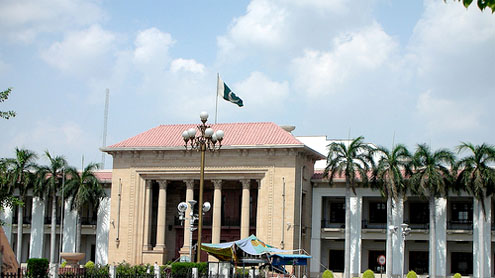
While the PPP cheerleaders have yet to get rid of their rose tinted glasses those lower down are having second thoughts about the party’s electoral prospects.
The PPP rose to power riding the sympathy wave after the killing of its chairperson Benazir Bhutto in 1988. The PPP however failed to emerge as a single majority party at the centre or in any province other than Sindh. It has ruled for full five years and cannot complain that it failed to fulfill its election electoral promises because, like its earlier stints in power in the 1990s, its tenure was yet again cut short.
The PPP rule has been characterized by high inflation, unemployment and power-cum-gas shortages that afflicted millions leading to innumerable protests. Among the colossal failures of the party was Karachi, where target killings continued without respite throughout its tenure. Another failure has been Balochistan, which was marred by misrule. Here hundreds of forced disappearances took place year after year, tortured bodies of the youth continued to be dumped on the roadside and the Hazara Shia community was subjected to ethnic cleansing.
The PPP government meanwhile watched all this without doing anything to stop it. The PPP rule was plagued with reports of financial scams at the highest level. During the period, the PPP offered little to the common man. While it won the recent by-elections held in Sindh, the voter turnout was low, indicating a reduction in enthusiasm about the party in its traditional stronghold. The PPP will face the negative fallout of incumbency in 2013 elections. The party is already feeling the heat.
It is unusual for desertions to take place in a party in power at the centre and three provinces. In Sindh which is treated like a fief by the PPP, an MPA has resigned to join the PML-F weeks before the dismissal of assemblies. Earlier in the Punjab nine party MPAs had resigned, four of them from the Seraiki belt. The PPP had hopes that the promise of a Seraiki province would increase its popularity manifold in the region. This is not exactly what was being expected.
With the elections drawing near, most of PPP’s old allies have decided to go their own way. Some have already joined hands with the opposition. The policy of reconciliation with all helped the PPP to retain power. It has now lost steam. The ANP, PML-F and NPP abandoned the coalition in Sindh only months back. The ANP has now returned to the fold after the scrapping of the local bodies law by the PPP which had earlier enacted it.
After remaining a part of the PPP coalition for five year the PML-F and NPP have joined hands with PML-N while they are also in contact with the Sindhi nationalists, JUI-F, Sunni Tehrik and JI to jointly challenge the PPP in Sindh. This has provided an opportunity to Nawaz Sharif to establish a foothold in the province. Despite the high hopes on the part of Pir Pagara, the alliance may not be able to make a major dent in interior Sindh but there is a likelihood of the PPP losing some of the seats instead of increasing them.
Despite attempts by Zardari, the central leadership of ANP is no more interested in alliance or seat adjustment with PPP in KP. The ANP president, Asfandyar Wali Khan, has said that if there was one political party he would not get into an electoral alliance with, it was the PPP. In case the MQM and PPP are seen to be collaborating during the elections, the Sindh chapter of the ANP unhappy with what it considers an under representation of the Pushtuns in Sindh Assembly may align with the new anti-PPP united front in the province.
While it sits on the opposition benches in the Sindh Assembly, the MQM is widely considered a PPP ally. What remains to be seen is the performance of the party in Karachi this time. There is a likelihood of the MQM losing some of its seats due to the presence of a neutral Election Commission and caretaker set up. The party is also facing an internal turmoil. In case the ANP decides to join hands with the Pagara-Nawaz front, the new conglomeration of forces could make a dent in what the MQM treats as its stronghold. Even if the PPP forms a government in Sindh, it will have to cope with a much stronger opposition in the provincial assembly.
The only sure ally the PPP is left with is the defection-prone PML-Q. The party is now a shadow of what it was in 2008. Many in the PPP itself are not sure if this particular ally is an asset or a liability, particularly in Punjab. The party has alternately relied on the PML-Q and Manzur Wattoo but failed to make any headway. The joint candidates put up by the two parties suffered defeat in December by-elections. It may not be any different during the forthcoming elections. The PML-Q’s chapters in Sindh and KP are already depleted. In Balochistan numerous influential figures who joined what was considered in 2008 the King’s Party on the prodding of the agencies are now waiting for fresh guidance from their patrons.
The PPP is expected to get fewer seats this time than in 2008. Does the party have a chance to form its government, then? There seems to be no likelihood of the party’s support shrinking to the 1997 level when it could only win 18 National Assembly seats. Despite its expected bad electoral performance due to its unconcern for the lot of the common man, the party still has a reservoir of diehard supporters, particularly in the rural Sindh. What is more, the PML-N and the PTI with their bias for the extremists have little appeal among a considerable section of the population. Both factors favour the PPP.
In 2008, Zardari, who is a past master at realpolitik, turned out to be a better bridge builder with other parties than Nawaz Sharif. However, in case the PPP fails to emerge as the largest single party, Zadari will be deprived of the advantage he had then. Any party with the largest seats in the NA will be in a better position to form a coalition. Zardari will have to compete with Nawaz and perhaps Imran Khan when the exercise begins soon after the elections.
Nawaz has already got rid of the scruples he had in 2008 when he was not willing to touch the PML-Q with JUI-F and even the MQM with a a bargepole. He is now as unprincipled in matters of choosing allies as anyone else. Imran Khan remains choosy about alliances. How long he sticks to the policy remains to be seen. What will matter in the hung parliament the country is likely to have is the ability of a party to forge alliances combined with a basic minimum of votes that it must get if it has to play the role of a negotiator. What many will keenly watch is, whether the PPP is able to emerge as a significant parliamentary force that other are willing to listen to. – PT












